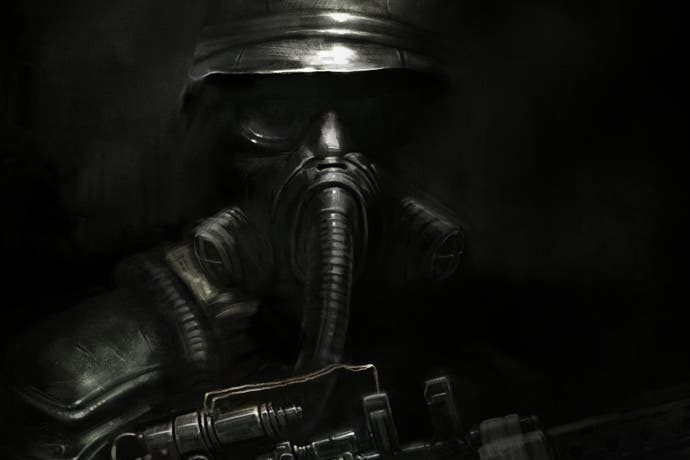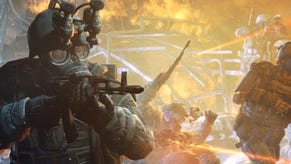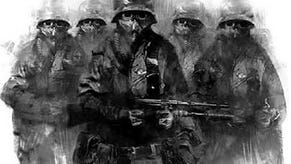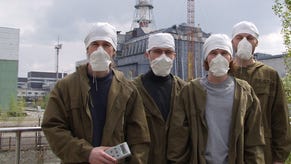Metro: Last Light review
Bleep... bleep... blops?
Some games seem bad because they are. With Metro: Last Light, it's more a question of expectations: what do you want from the Metro series? For me, it's a scary and dark post-nuclear Russian underground, a first-person survival horror-slash-shooter with scarce resources and terrifying scenarios. There's a bit of that, to be sure. But if you also want tits, QTEs and hand-holding companions, then congratulations - you're part of the wider audience this game is looking for.
Metro: Last Light is a game torn between the niche its predecessor staked out and genre conventions that are perceived to help sales. So, to give one example, you're accompanied for large stretches of the game's first half - a crutch at the best of times, and one that rather taints the atmosphere here. Not that your companions Anna and Pavel are dislikeable characters - the latter's a chatty rogue with charm and surprises to spare - but their presence feels unnecessary.
Metro is based on Dmitri Glukhovsky's series of books, and the pitiless dystopia crafted over two volumes is one where humanity bleeds, both figuratively and literally. Metro 2033 caught this atmosphere in its tight corridors, and Last Light does the same, albeit with more caveats.
First, it's important to understand how Last Light is structured. Like the first game, this is a linear shooter that often gives you room to explore. This can mean finding a hidden locker with precious bullets or a whole annex stuffed with nasty surprises. It is a game designed to be savoured rather than rushed through. This is at its most obvious in the settlements you periodically stumble across; almost every character, and there are always a lot, has plenty of dialogue.
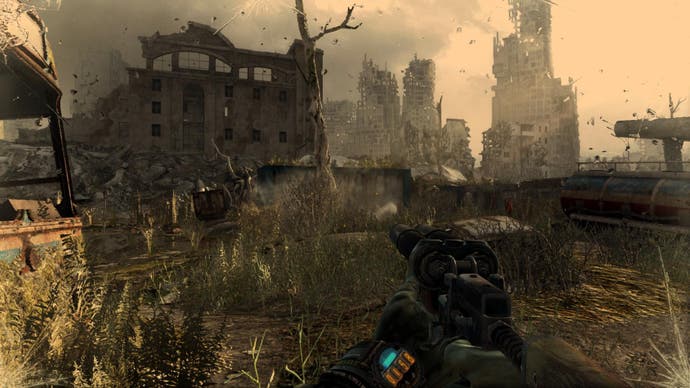
Last Light's primary method of narrative delivery is eavesdropping. When entering a town, I stop and listen to the first conversation. I walk a few steps forward and do the next, then the next, and so on. I'm not saying this is necessarily bad. But it is definitely watching rather than playing and, agonised by the possibility of missing key dialogue, I sit there twiddling my thumbs.
There's no other choice, because this is where Last Light's best stories are - from the widow being told her husband was lost on a patrol, to parents reassuring their children with little lies. Often, details from what you hear will crop up further down the line, small and large, and sometimes you can get our hero Artyom involved. The only point where such enforced passivity becomes truly irksome is when it bleeds too much into the action. Stealth sections often begin with a small group of guards chatting; once the conversation is over, which can take minutes, they'll move into much more vulnerable positions. You don't really have a choice.
With that said, stealth is the most enjoyable combat mechanic here, which is largely down to how it ties into light. All large rooms with enemies have light switches somewhere around, which can easily be flipped off. The guards, in this run-down environment, are used to temperamental lighting and so don't panic at a temporary blackout. Instead, they all turn on head-mounted torches and send someone over to check the box.
It's not something that works well in screenshots, sadly, but Last Light is at its most beautiful in these situations: a pitch-black room full of obstacles, with beams of light slicing through the sightlines. It's not only gorgeous, but a brilliant way of indicating the enemy's vision, and leads to Last Light's most thrilling moments - on Hard, at least. Unfortunately, Normal makes stealth a little too simple.
Last Light's human enemies are much better opponents than the monsters. The latter are from a poor man's Doom
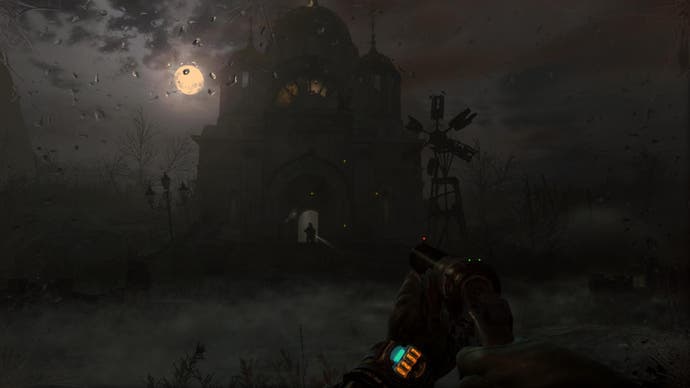
Even then, it is one of the main reasons that Last Light's human enemies are much better opponents than the monsters. The latter are from a poor man's Doom and, though they can kill you easily enough, they never feel fun to fight. Backpedal and strafe, backpedal and strafe. Fighting opposition soldiers is a much more enjoyable task thanks to their group AI and absolutely deadly concentrated firepower - a challenge so stiff, it's often why you want to escape notice in the first place.
It's not all gunfights, and Last Light's atmosphere is at its most pungent when there's no-one else around. The environmental narrative basically comes down to bodies. As you move through the tunnels, the corpses of those who came before are a constant presence, fixed in positions that tell something of their end: the skeletons of a family, huddled away together, or the body of a ranger slumped next to the last thing he killed.
And it's in the tunnels, cramped and dark, that you realise the sound is the scariest thing here. The surround effect is used to disorient you, confusing with multiple approaches while the threats get ever closer - and the noises are purely terrifying. This is a game where you spend a lot of time in badly lit spaces. The chittering in the walls and the scrape of claws behind you never get familiar.
But for all that Last Light keeps the spirit of its predecessor alive, there are moments here that lose a huge amount of the game's charm. At one point you visit 'Venice', which is the cultural capital of the Metro. It turns out that the famous Bolshoi ballet has now become a variety act including a can-can performance, which is kind of a funny joke. But the way it's made, featuring several see-through bras and an entire row of ridiculously jiggling boobs, is tawdry. I hate to break it to Last Light's developers, but breasts don't move like that.
Think tawdry is too strong a word? After this, you get to walk through the girls' dressing room in case you want a closer look, and then there are a few more naked women behind frosted glass a bit further up the path. Later, you can pay for a striptease - of course you can! Carry on up the Metro, eh?
Such tonal idiocy isn't even the worst part. Last Light's nadir is the attritional approach to one of the worst bosses in gaming history: Big Momma. The sections prior to the actual confrontation force you into combat with feral watchmen (basically gorillas with claws) and one moment in particular - waiting for a lift to descend while fighting off waves of them - had me gnashing my teeth in frustration. I eventually got through after expending all ammo, hit the checkpoint before the Big Momma fight, went in and got planted.
Metro 2033 was flawed but trying to do its own thing. If anything, Last Light feels like a regression
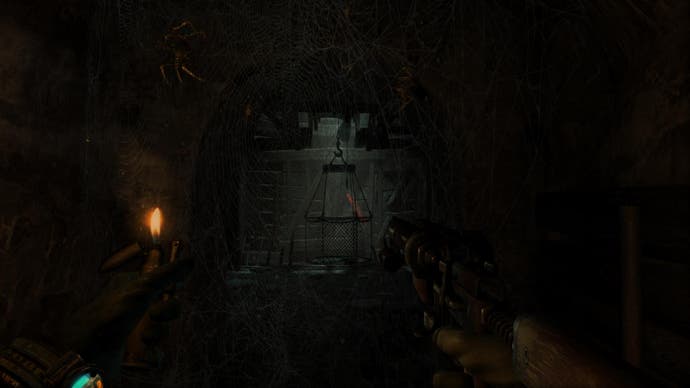
Restarting, I needed more ammo. Sure enough, I'd overlooked some stashes. Once more unto the breach and, having memorised her attacks and easily dismissed the bodyguards, I unloaded every single bullet into her face. She didn't die, which was a bit of a problem. I retried this fight many, many times, becoming super-efficient with the ammo and trying all sorts of crazy strategies - the enclosed battlefield is full of support columns and walls she can destroy, so I matador'd her into every one. Nothing. A previous incident showed Big Momma's weight collapsing a wooden floor. The middle of the arena looked wooden. So I danced around her on top of it for 20 minutes, praying she'd fall through. Not today, she said.
I eventually beat Big Momma when she got stuck in an AI loop next to a wall and stopped attacking, at which point I fearlessly approached and stabbed her in the face about 200 times. It was probably 10 minutes, but it felt like three hours, and of course as she collapsed I was rewarded with an achievement. At this point, Metro: Last Light joined a very exclusive club of games that have made me think about what I'm doing with my life.
Metro: Last Light is not a bad game, but nor is it a good one in quite the same sense as its predecessor. Metro 2033 was flawed but trying to do its own thing. If anything, Last Light feels like a regression. Similarities abound, but this is a more conservative FPS, one looking at the competition rather than itself, and one with some terrible missteps. So go in with low expectations, and you might be pleasantly surprised. Not the highest praise, is it?
